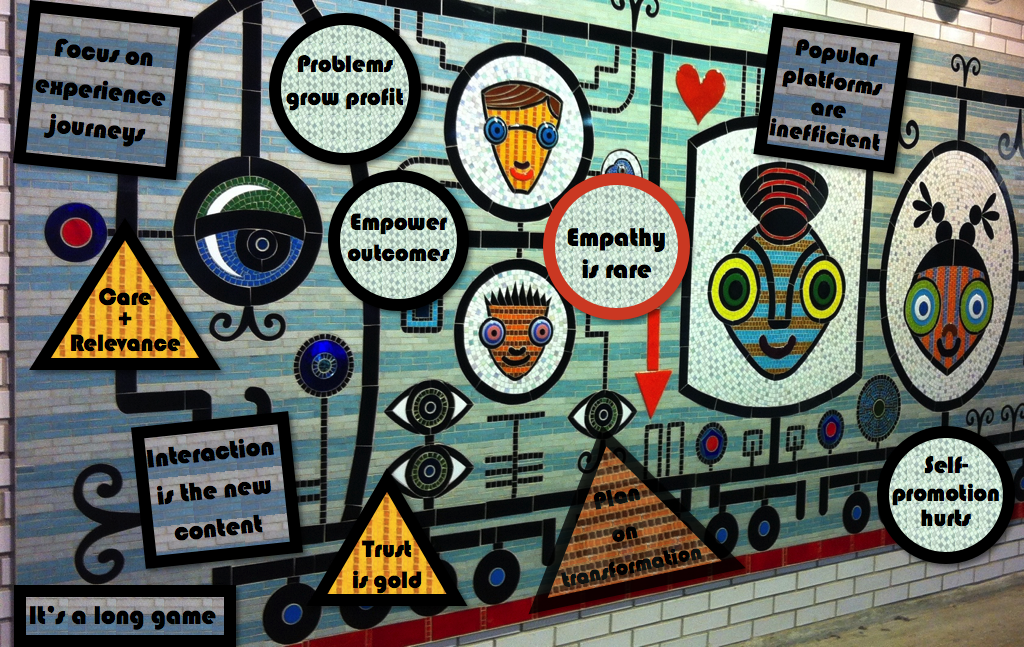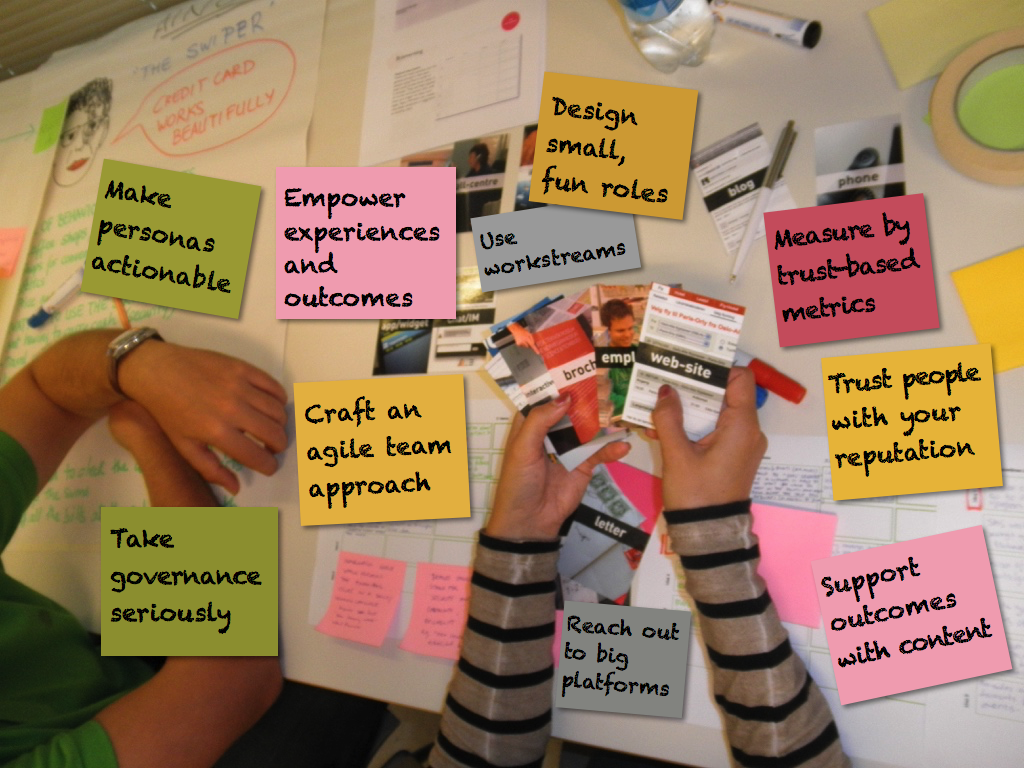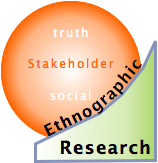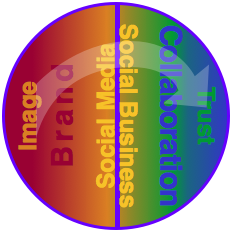 [Updated] Many businesses live in fear, and how to break free reveals how fear and risk can be sharply reduced by increasing trust among employees, customers and partners. [Updated] Many businesses live in fear, and how to break free reveals how fear and risk can be sharply reduced by increasing trust among employees, customers and partners.
I have learned many surprising things while practicing experiential social media, but one of the most astounding is the realization that most business practices, especially those that concern people, are grounded in fear and mistrust. This ties businesses in knots, but few people realize it because it’s accepted as normal. This post aims to open your eyes, so you can start noticing how fear and mistrust operate in your firm. Then I’ll offer numerous ideas that can help you to reduce fear and risk by increasing trust.
[…]
 Ethnographic research for design explains how to use advances in ethnographic research of social media to design products, services, experiences… anything—while getting better results at lower risk. Ethnographic research of social media is breakthrough for designers in the “design stack” in which I’ve includedArchitecture/Interior Design, Product Design, User Experience Design/Interaction Design, UX Strategy, Service Design and Customer Experience Design. Ethnographic research for design explains how to use advances in ethnographic research of social media to design products, services, experiences… anything—while getting better results at lower risk. Ethnographic research of social media is breakthrough for designers in the “design stack” in which I’ve includedArchitecture/Interior Design, Product Design, User Experience Design/Interaction Design, UX Strategy, Service Design and Customer Experience Design.
Designers in all fields lament clients’ resistance to funding robust research. Traditional design research methods are often grounded in asking proposed users explicit questions, and self-reported responses vary significantly from actual behavior despite respondents’ best intentions. Similarly, shadowing, service safaris, “a day in the life,” and other analog research methods are costly and slow. Sample sizes are necessarily small because scaling analog methods greatly multiplies the budget and length of the research phase. Ethnographic research of social media changes the game because it studies proposed users’ actual behavior in digital public when they’re having heated discussions about the outcomes they want when the proposed product, service, or process is useful to them. It […]
Social media strategy lessons learned summarizes eleven golden rules I’ve learned while leading strategy and its execution for global firms. Some of them might surprise you: I’ve come to learn that I have a different perspective on social media strategy since I advised global firms and startups in their corporate strategies before founding CSRA in 2006.

Before diving into lessons learned, let’s specify what we mean by social media strategy. “Strategy” itself is an overused work that denotes some mixture of research and planning. The strategy trade-off is simple: the more research and analysis you do upfront, the more risks you can foresee and account for in your plan. When you put your plan into action, you make fewer mistakes and execute more efficiently. Conversely, “minimum viable”/lean strategy does less research upfront, so the team learns while doing. Neither approach is universally “right,” and both work best for certain situations and firms.
[…]
Social media strategy good practices is a short list of principles that can make your firm stand out when empowering customer and employee experience. It’s part of a talk I gave today to a large multidisciplinary team. Their venerable institution plans to use social media strategy to get the ducks in a row without too much squawking. The most exciting aspect of social media strategy is that there’s so much room for improvement: while your peers and competitors are trying to “engage” with finely crafted-yet-impersonal content, you can power past them using experiential social media, which focuses on scalable interaction.

Here are the cliff notes to the good practices part of our discussion:
[…]
 The connected car and customer experience reveals a new opportunity for carmakers to dial into real customer behavior and desires around connected cars and autonomous cars. The Connected car and the autonomous car are powerful services that will help transform how people move around, and they are emerging during an era of unprecedented volatility in markets. I’ll wager that there’s never been a better or more challenging time to be a carmaker because opportunities and threats have never been higher. I’ve been fortunate to meet product managers and engineers who are pioneering connected and autonomous car services. I’ve also been meeting leaders in the Internet of Things (smart devices), of which the connected car is a part. The connected car and customer experience reveals a new opportunity for carmakers to dial into real customer behavior and desires around connected cars and autonomous cars. The Connected car and the autonomous car are powerful services that will help transform how people move around, and they are emerging during an era of unprecedented volatility in markets. I’ll wager that there’s never been a better or more challenging time to be a carmaker because opportunities and threats have never been higher. I’ve been fortunate to meet product managers and engineers who are pioneering connected and autonomous car services. I’ve also been meeting leaders in the Internet of Things (smart devices), of which the connected car is a part.
My crystal ball says that the connected car is a bet-the-brand proposition for carmakers because it directly addresses competing on customer experience, the most disruptive trend of all. As I detailed in The Social Channel, we have moved from a product/service-based economy toward an experience economy. Even IT analyst Gartner has proclaimed that customer experience is the final battleground for firms. […]
 Ethnographic research for product management shows how to apply ethnographic research of social media to managing the life cycle of products and services. Ethnographic research of social media can revolutionize product management because it’s a very efficient way to study people’s behavior and motivations in each part of the product life cycle. Unlike traditional product and ethnographic research methods, which are relatively slow, costly and qualitative, ethnographic research of social media combines qualitative richness with quantitative analysis. It’s faster and less costly, too. Ethnographic research for product management shows how to apply ethnographic research of social media to managing the life cycle of products and services. Ethnographic research of social media can revolutionize product management because it’s a very efficient way to study people’s behavior and motivations in each part of the product life cycle. Unlike traditional product and ethnographic research methods, which are relatively slow, costly and qualitative, ethnographic research of social media combines qualitative richness with quantitative analysis. It’s faster and less costly, too.
This post outlines the product management use case of ethnographic research of social media. For more on ethnographic research, see its executive summary.
[…]
 [Updated] Ethnographic research of social media is one of my biggest secrets. It has become the foundation of CSRA’s ability to create trust at scale, so here I’ll share how I came to use it with social media. Then I’ll explain what ethnographic research is, why it’s vital to CSRA, and how it works, so you can use it. Finally, I’ll share use cases for experiential social media, product management, business innovation, and cross-border business. [Updated] Ethnographic research of social media is one of my biggest secrets. It has become the foundation of CSRA’s ability to create trust at scale, so here I’ll share how I came to use it with social media. Then I’ll explain what ethnographic research is, why it’s vital to CSRA, and how it works, so you can use it. Finally, I’ll share use cases for experiential social media, product management, business innovation, and cross-border business.
[…]
 The short guide to forum outreach reveals how experiential social media teams can tap forums’ unique opportunity to engage users, using a three-stage model. Forums are vital to relationship building with people with specific interests. They are consistently the most people-centric platform type according to CSRA’s research in such diverse industries as healthcare, consumer products, financial services, government, and nonprofits. As such, although they are very human and social, forums are distinct from social media, which often enables social actions oriented to content sharing and short exchanges. The short guide to forum outreach reveals how experiential social media teams can tap forums’ unique opportunity to engage users, using a three-stage model. Forums are vital to relationship building with people with specific interests. They are consistently the most people-centric platform type according to CSRA’s research in such diverse industries as healthcare, consumer products, financial services, government, and nonprofits. As such, although they are very human and social, forums are distinct from social media, which often enables social actions oriented to content sharing and short exchanges.
In some ways, forums are the polar opposite of social media because their DNA is threaded discussions, which enable long conversations among many members. Even more exciting, the most passionate members are often members of several forums that are relevant to your stakeholders and workstreams.
[…]
 This short guide to blog infrastructure outlines some of the basics for how to choose a platform and make best use of basic blog features, so your blog will encourage interactions with your high-priority readers. Most brands and people use blogs for content marketing, but it competes for pocket change and leaves the bills on the table. Here you’ll learn how to organize your blog, so it engages readers more deeply by relating to them in distinctive ways. Before delving into some bits and bytes of blog software and features, I’ll outline a new way to approach engagement that changes the rules, which are themselves a kind of infrastructure. This short guide to blog infrastructure outlines some of the basics for how to choose a platform and make best use of basic blog features, so your blog will encourage interactions with your high-priority readers. Most brands and people use blogs for content marketing, but it competes for pocket change and leaves the bills on the table. Here you’ll learn how to organize your blog, so it engages readers more deeply by relating to them in distinctive ways. Before delving into some bits and bytes of blog software and features, I’ll outline a new way to approach engagement that changes the rules, which are themselves a kind of infrastructure.
[…]
Using Social Media and Social Business Together to Evolve Experience reveals differences between “the two socials,” and its startling conclusion is that most businesses will benefit from keeping them separate but related during the next three years.
 [Updated] There’s a much deeper context that makes the two socials vital: many of the assumptions on which business is built are being completely disrupted. For only one example, as Chief Marketer myself, I used to follow the mantra, “We always want to show our brand in the most positive light” (even when we’re lackluster). That impulse is increasingly risky. Take a few minutes and reflect on how profound that change is. Entire marketing and public relations industries are built on it, and it is very risky because people reveal the obfuscation and half-truths that used to work. There is no such thing as a “half” truth. [Updated] There’s a much deeper context that makes the two socials vital: many of the assumptions on which business is built are being completely disrupted. For only one example, as Chief Marketer myself, I used to follow the mantra, “We always want to show our brand in the most positive light” (even when we’re lackluster). That impulse is increasingly risky. Take a few minutes and reflect on how profound that change is. Entire marketing and public relations industries are built on it, and it is very risky because people reveal the obfuscation and half-truths that used to work. There is no such thing as a “half” truth.
From a practical standpoint, organizations need to manage their way through the transition to pervasive transparency, pacing their evolution with changing stakeholder expectations. This is where social media and social […]
|
|
 [Updated] Many businesses live in fear, and how to break free reveals how fear and risk can be sharply reduced by increasing trust among employees, customers and partners.
[Updated] Many businesses live in fear, and how to break free reveals how fear and risk can be sharply reduced by increasing trust among employees, customers and partners.
 Ethnographic research for design explains how to use advances in ethnographic research of social media to design products, services, experiences… anything—while getting better results at lower risk. Ethnographic research of social media is breakthrough for designers in the “design stack” in which I’ve includedArchitecture/Interior Design, Product Design, User Experience Design/Interaction Design, UX Strategy, Service Design and Customer Experience Design.
Ethnographic research for design explains how to use advances in ethnographic research of social media to design products, services, experiences… anything—while getting better results at lower risk. Ethnographic research of social media is breakthrough for designers in the “design stack” in which I’ve includedArchitecture/Interior Design, Product Design, User Experience Design/Interaction Design, UX Strategy, Service Design and Customer Experience Design.

 The connected car and customer experience reveals a new opportunity for carmakers to dial into real customer behavior and desires around connected cars and autonomous cars. The Connected car and the autonomous car are powerful services that will help transform how people move around, and they are emerging during an era of unprecedented volatility in markets. I’ll wager that there’s never been a better or more challenging time to be a carmaker because opportunities and threats have never been higher. I’ve been fortunate to meet product managers and engineers who are pioneering connected and autonomous car services. I’ve also been meeting leaders in the Internet of Things (smart devices), of which the connected car is a part.
The connected car and customer experience reveals a new opportunity for carmakers to dial into real customer behavior and desires around connected cars and autonomous cars. The Connected car and the autonomous car are powerful services that will help transform how people move around, and they are emerging during an era of unprecedented volatility in markets. I’ll wager that there’s never been a better or more challenging time to be a carmaker because opportunities and threats have never been higher. I’ve been fortunate to meet product managers and engineers who are pioneering connected and autonomous car services. I’ve also been meeting leaders in the Internet of Things (smart devices), of which the connected car is a part. Ethnographic research for product management shows how to apply ethnographic research of social media to managing the life cycle of products and services. Ethnographic research of social media can revolutionize product management because it’s a very efficient way to study people’s behavior and motivations in each part of the product life cycle. Unlike traditional product and ethnographic research methods, which are relatively slow, costly and qualitative, ethnographic research of social media combines qualitative richness with quantitative analysis. It’s faster and less costly, too.
Ethnographic research for product management shows how to apply ethnographic research of social media to managing the life cycle of products and services. Ethnographic research of social media can revolutionize product management because it’s a very efficient way to study people’s behavior and motivations in each part of the product life cycle. Unlike traditional product and ethnographic research methods, which are relatively slow, costly and qualitative, ethnographic research of social media combines qualitative richness with quantitative analysis. It’s faster and less costly, too. [Updated] Ethnographic research of social media is one of my biggest secrets. It has become the foundation of CSRA’s ability to create trust at scale, so here I’ll share how I came to use it with social media. Then I’ll explain what ethnographic research is, why it’s vital to CSRA, and how it works, so you can use it. Finally, I’ll share use cases for experiential social media, product management, business innovation, and cross-border business.
[Updated] Ethnographic research of social media is one of my biggest secrets. It has become the foundation of CSRA’s ability to create trust at scale, so here I’ll share how I came to use it with social media. Then I’ll explain what ethnographic research is, why it’s vital to CSRA, and how it works, so you can use it. Finally, I’ll share use cases for experiential social media, product management, business innovation, and cross-border business. The short guide to forum outreach reveals how experiential social media teams can tap forums’ unique opportunity to engage users, using a three-stage model. Forums are vital to relationship building with people with specific interests. They are consistently the most people-centric platform type according to CSRA’s research in such diverse industries as healthcare, consumer products, financial services, government, and nonprofits. As such, although they are very human and social, forums are distinct from social media, which often enables social actions oriented to content sharing and short exchanges.
The short guide to forum outreach reveals how experiential social media teams can tap forums’ unique opportunity to engage users, using a three-stage model. Forums are vital to relationship building with people with specific interests. They are consistently the most people-centric platform type according to CSRA’s research in such diverse industries as healthcare, consumer products, financial services, government, and nonprofits. As such, although they are very human and social, forums are distinct from social media, which often enables social actions oriented to content sharing and short exchanges. This short guide to blog infrastructure outlines some of the basics for how to choose a platform and make best use of basic blog features, so your blog will encourage interactions with your high-priority readers. Most brands and people use blogs for content marketing, but it competes for pocket change and leaves the bills on the table. Here you’ll learn how to organize your blog, so it engages readers more deeply by relating to them in distinctive ways. Before delving into some bits and bytes of blog software and features, I’ll outline a new way to approach engagement that changes the rules, which are themselves a kind of infrastructure.
This short guide to blog infrastructure outlines some of the basics for how to choose a platform and make best use of basic blog features, so your blog will encourage interactions with your high-priority readers. Most brands and people use blogs for content marketing, but it competes for pocket change and leaves the bills on the table. Here you’ll learn how to organize your blog, so it engages readers more deeply by relating to them in distinctive ways. Before delving into some bits and bytes of blog software and features, I’ll outline a new way to approach engagement that changes the rules, which are themselves a kind of infrastructure. [Updated] There’s a much deeper context that makes the two socials vital: many of the assumptions on which business is built are being completely disrupted. For only one example, as Chief Marketer myself, I used to follow the mantra, “We always want to show our brand in the most positive light” (even when we’re lackluster). That impulse is increasingly risky. Take a few minutes and reflect on how profound that change is. Entire marketing and public relations industries are built on it, and it is very risky because people reveal the obfuscation and half-truths that used to work. There is no such thing as a “half” truth.
[Updated] There’s a much deeper context that makes the two socials vital: many of the assumptions on which business is built are being completely disrupted. For only one example, as Chief Marketer myself, I used to follow the mantra, “We always want to show our brand in the most positive light” (even when we’re lackluster). That impulse is increasingly risky. Take a few minutes and reflect on how profound that change is. Entire marketing and public relations industries are built on it, and it is very risky because people reveal the obfuscation and half-truths that used to work. There is no such thing as a “half” truth.